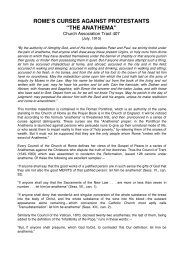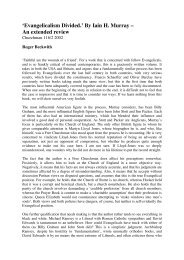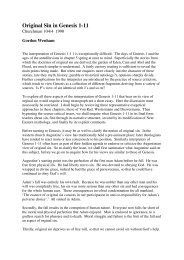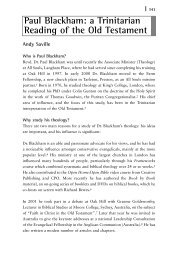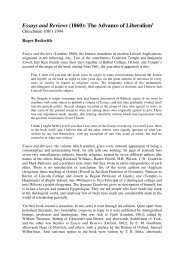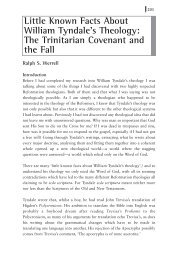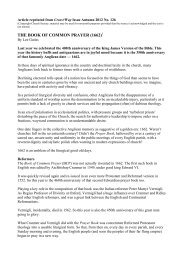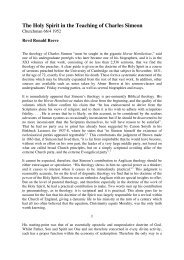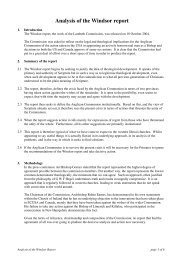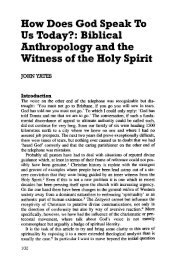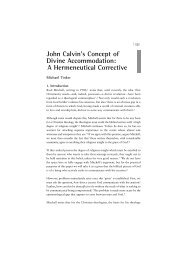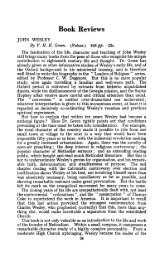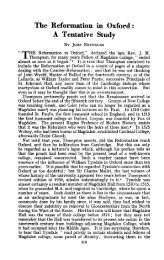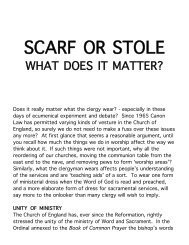The Place of the Imprecatory Psalms in the Canon ... - Church Society
The Place of the Imprecatory Psalms in the Canon ... - Church Society
The Place of the Imprecatory Psalms in the Canon ... - Church Society
You also want an ePaper? Increase the reach of your titles
YUMPU automatically turns print PDFs into web optimized ePapers that Google loves.
A f<strong>in</strong>al, but important, recurr<strong>in</strong>g <strong>the</strong>me <strong>in</strong> <strong>the</strong>se <strong>Psalms</strong> is <strong>the</strong> writer’s constant appeal to<br />
Yahweh, who is his covenant God. He recognises that only God can save him and so he<br />
prays. Psalm 35 beg<strong>in</strong>s with an appeal to Yahweh to contend with David’s enemies, and <strong>the</strong><br />
same desire is expressed towards <strong>the</strong> end, before <strong>the</strong> vow <strong>of</strong> praise (v 23). Psalm 58 makes<br />
clear that it is God alone who judges <strong>the</strong> earth (v 11) and it is to him that <strong>the</strong> writer appeals (v<br />
6). Psalm 69 beg<strong>in</strong>s with a personal appeal for God to save David and ends with <strong>the</strong><br />
recognition that it is God who will save Zion (vv 35-6). Psalm 137 is perhaps <strong>the</strong> most<br />
difficult <strong>of</strong> <strong>the</strong> <strong>Psalms</strong> to understand <strong>in</strong> this context, <strong>in</strong> <strong>the</strong> light <strong>of</strong> <strong>the</strong> statement regard<strong>in</strong>g<br />
human participation <strong>in</strong> <strong>the</strong> judgment aga<strong>in</strong>st <strong>the</strong> Babylonians; yet even here Yahweh is<br />
appealed to <strong>in</strong> verse 7, and <strong>the</strong>re is no direct call for <strong>the</strong> exiles to take action. Moreover, <strong>the</strong><br />
emphasis on <strong>the</strong> holy city is important <strong>in</strong> understand<strong>in</strong>g <strong>the</strong> underly<strong>in</strong>g faith <strong>in</strong> a covenant<br />
Yahweh.<br />
This covenantal basis <strong>of</strong> Psalm 109 is very clear, as is David’s appeal to God to accomplish<br />
<strong>the</strong> judgments for which he calls. This is a very important po<strong>in</strong>t, not simply demonstrat<strong>in</strong>g <strong>the</strong><br />
faith <strong>of</strong> <strong>the</strong> Psalmist <strong>in</strong> God’s power to save, but show<strong>in</strong>g his desire to put his troubles and,<br />
more particularly, <strong>the</strong> fate <strong>of</strong> his enemies <strong>in</strong> <strong>the</strong> hands <strong>of</strong> God. David himself is not plann<strong>in</strong>g<br />
revenge; that is why he prays to God. <strong>The</strong> imprecations, <strong>in</strong> this sense, are an expression <strong>of</strong><br />
trust <strong>in</strong> Yahweh, hand<strong>in</strong>g over all responsibility for judgment and retribution to him, <strong>the</strong><br />
faithful covenant God. 53<br />
<strong>The</strong> <strong>Imprecatory</strong> <strong>Psalms</strong> and <strong>the</strong> Psalter<br />
We have shown that <strong>the</strong>re are a number <strong>of</strong> important <strong>the</strong>mes that are essential for<br />
understand<strong>in</strong>g <strong>the</strong> <strong>Imprecatory</strong> <strong>Psalms</strong> correctly. <strong>The</strong>se are a supreme concern for God’s<br />
glory, a desire for retributive justice, a sense <strong>of</strong> righteousness and <strong>the</strong> need for v<strong>in</strong>dication,<br />
toge<strong>the</strong>r with an underly<strong>in</strong>g awareness <strong>of</strong> <strong>the</strong> covenant relationship and dependence upon<br />
Yahweh. It must now be asked whe<strong>the</strong>r <strong>the</strong>se particular <strong>the</strong>mes are found <strong>in</strong> <strong>the</strong> rest <strong>of</strong> <strong>the</strong><br />
Psalter, particularly with regard to those o<strong>the</strong>r <strong>Psalms</strong> that refer to enemies; <strong>in</strong> this way we<br />
may ascerta<strong>in</strong> whe<strong>the</strong>r <strong>the</strong> <strong>Imprecatory</strong> <strong>Psalms</strong> are consonant with <strong>the</strong> rest <strong>of</strong> <strong>the</strong> Psalter, or<br />
whe<strong>the</strong>r <strong>the</strong>y diverge <strong>the</strong>ologically.<br />
‘At <strong>the</strong> core <strong>of</strong> <strong>the</strong> <strong>the</strong>ology <strong>of</strong> <strong>the</strong> Psalter is <strong>the</strong> conviction that <strong>the</strong> gravitational centre <strong>of</strong> life<br />
(<strong>of</strong> right human understand<strong>in</strong>g, trust, hope, service, morality, adoration), and also <strong>of</strong> history<br />
and <strong>of</strong> <strong>the</strong> whole creation (heaven and earth), is God (Yahweh).’ 54 Yahweh is at <strong>the</strong> centre <strong>of</strong><br />
<strong>the</strong> Psalter’s <strong>the</strong>ology and, as we have seen, he rema<strong>in</strong>s at <strong>the</strong> centre <strong>of</strong> <strong>the</strong> <strong>Imprecatory</strong><br />
<strong>Psalms</strong>, and even with<strong>in</strong> <strong>the</strong> imprecations <strong>the</strong>mselves Yahweh is appealed to (109: 14). <strong>The</strong><br />
Psalter is a book <strong>of</strong> prayer and praise, and it is <strong>the</strong> praise <strong>of</strong> Yahweh which dom<strong>in</strong>ates most<br />
people’s understand<strong>in</strong>g <strong>of</strong> <strong>the</strong> collection. 55 R<strong>in</strong>ggren, <strong>in</strong> a chapter entitled ‘<strong>The</strong>ocentric<br />
Religion’ writes:<br />
<strong>The</strong> ma<strong>in</strong> concern <strong>in</strong> <strong>the</strong> <strong>Psalms</strong> is not <strong>the</strong> welfare <strong>of</strong> <strong>the</strong> Psalmist, but <strong>the</strong> glory <strong>of</strong> God. God<br />
deals with man, and man calls for God’s attention, but <strong>the</strong> ultimate purpose <strong>in</strong> both cases is <strong>the</strong><br />
advancement <strong>of</strong> God’s glory. 56<br />
<strong>The</strong> po<strong>in</strong>t is that throughout <strong>the</strong> <strong>Psalms</strong> God is to be glorified, and <strong>the</strong>re is no contradiction to<br />
this <strong>in</strong> ei<strong>the</strong>r Psalm 109 or <strong>the</strong> o<strong>the</strong>r <strong>Imprecatory</strong> <strong>Psalms</strong>.<br />
Guthrie writes: ‘<strong>The</strong> Psalmists are motivated by zeal for <strong>the</strong> Holy One <strong>of</strong> Israel who must<br />
exercise retribution <strong>in</strong> <strong>the</strong> present moral order <strong>in</strong> <strong>the</strong> world.’ 57 This concept <strong>of</strong> God’s justice<br />
and <strong>the</strong> existence <strong>of</strong> a moral order is a significant idea throughout <strong>the</strong> Psalter. God ‘loves



